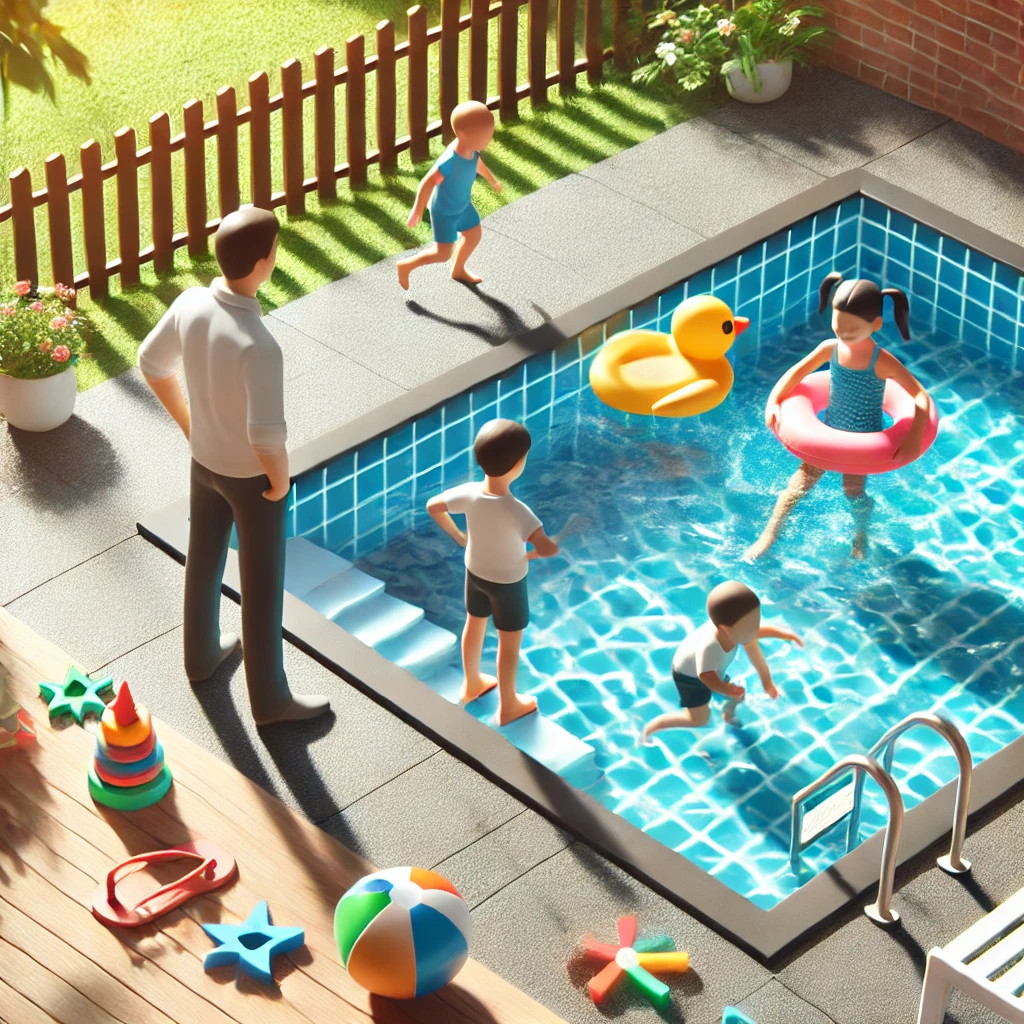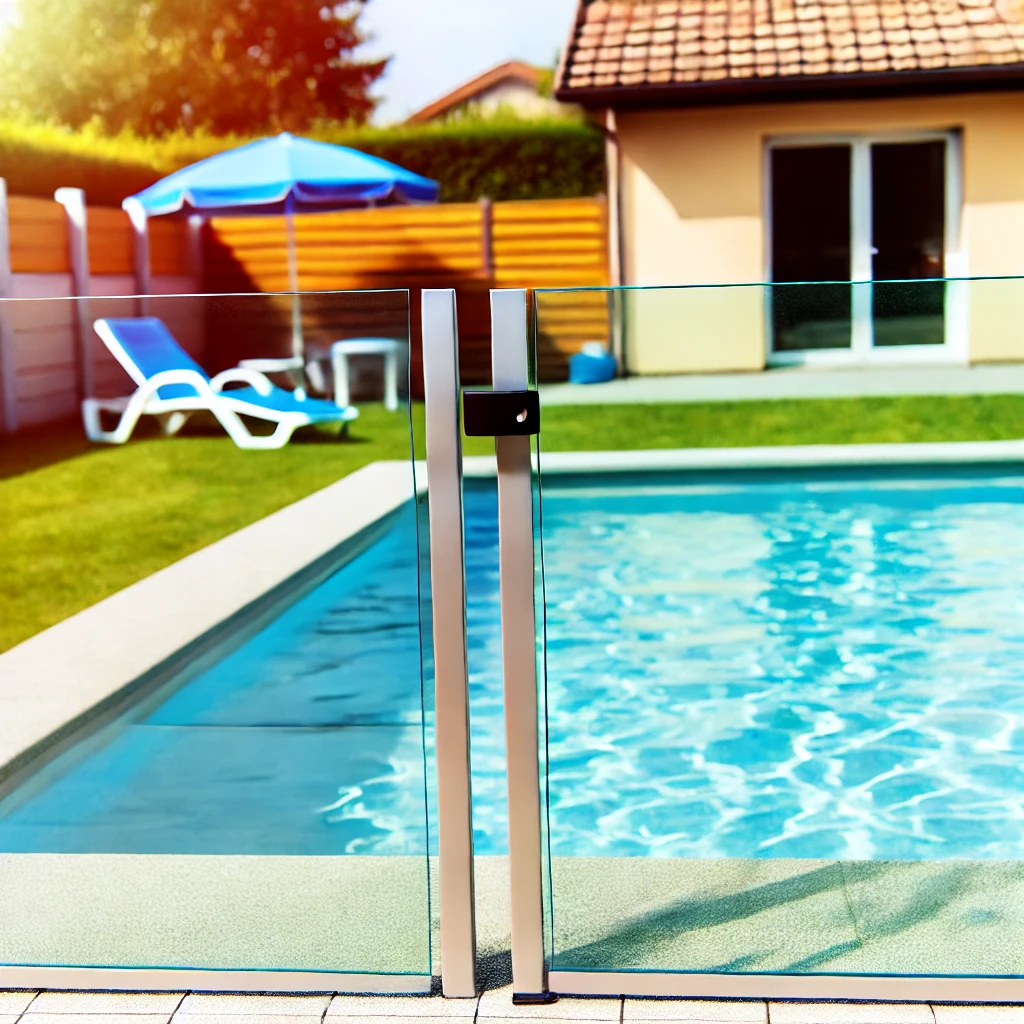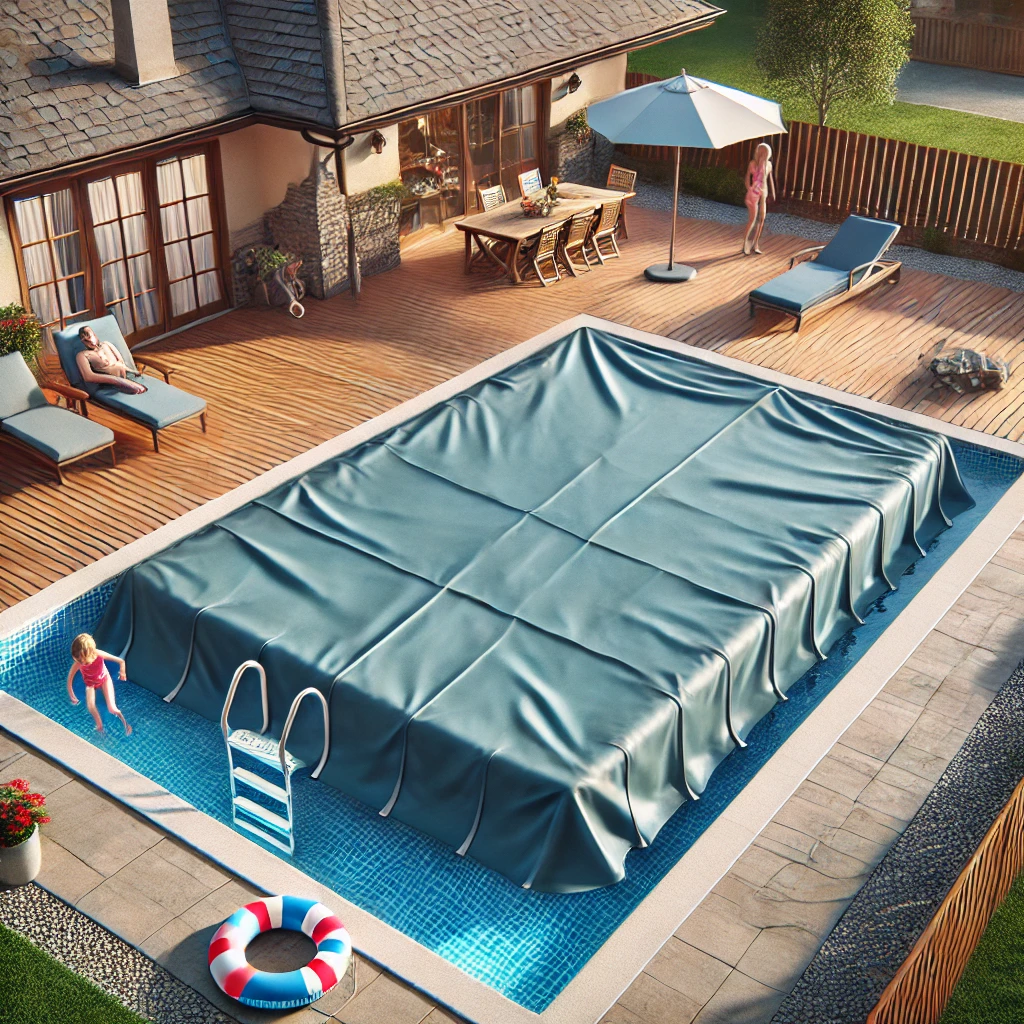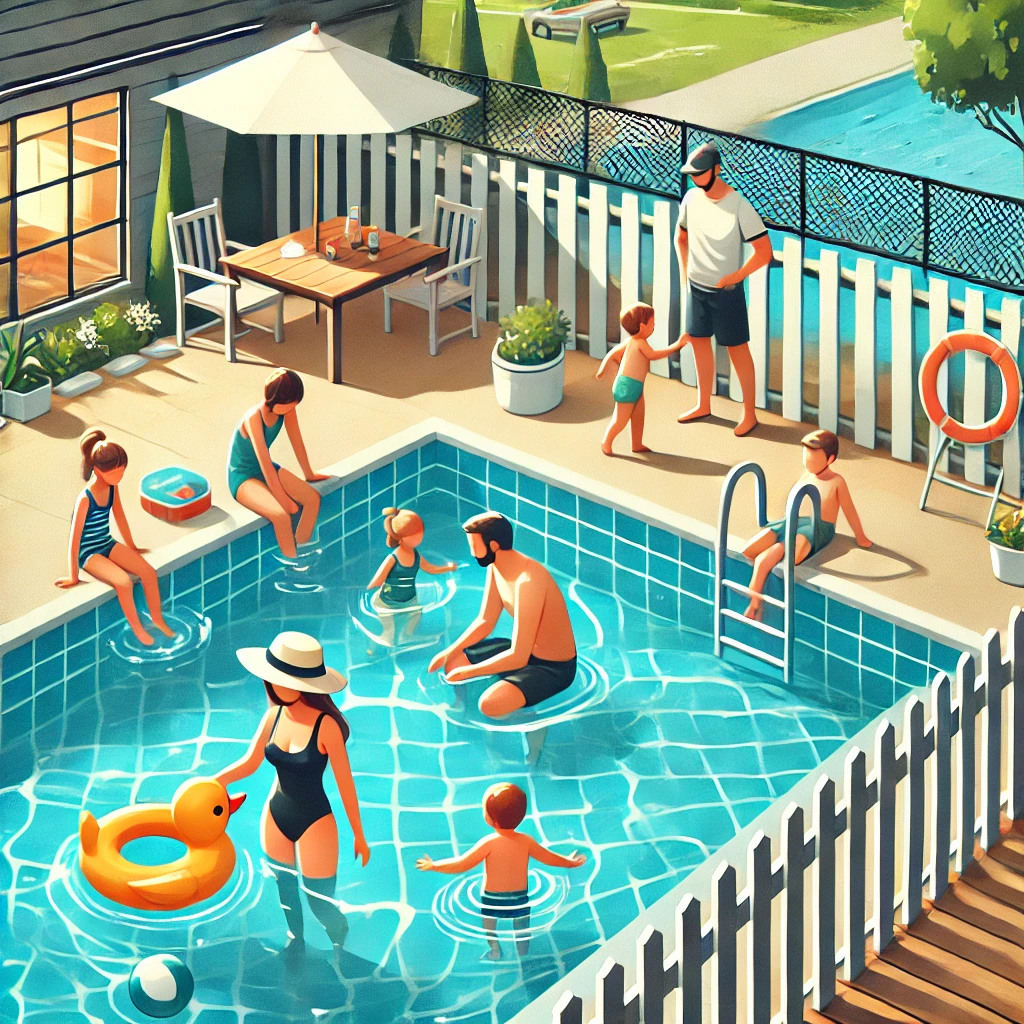Keep your family safe around the pool with these essential pool safety secrets.
From pool covers to supervision tips, here's everything parents need to know about keeping kids safe.
Owning a pool is one of the best parts of suburban living, especially if you’ve got kids who love to swim.
But as wonderful as pools are, they also come with a certain level of responsibility—especially when it comes to safety.
As a swimming pool construction expert, I’ve seen families add pools to their homes without fully understanding the risks.
Today, I’m going to share the pool safety secrets every parent should know to ensure your backyard pool remains a place of joy and not danger. Let’s dive in!

The Importance of Pool Safety for Families
pool safety should be a top priority
As a parent, you naturally want your kids to have fun, but pool safety should be a top priority.
Drowning is one of the leading causes of accidental death for young children, and it often happens silently.
You can’t rely on splashing or screams to alert you when something goes wrong. That’s why it’s so important to have multiple layers of safety measures in place.
A few years ago, I worked with a family who had just installed a pool. They were so excited to get it up and running for their kids, but I noticed that they hadn’t considered adding any safety features like a fence or pool cover.
After a long discussion, they decided to install both, and just a few weeks later, the mother told me that one day their toddler wandered outside while she was distracted. Luckily, the fence kept him away from the pool. This reinforced to me that safety isn’t just about convenience—it’s a lifesaver.

Physical Barriers and Pool Fencing
Why You Need Barriers Around Your Pool
One of the most effective ways to prevent accidents is to install a physical barrier like a pool fence.
Kids are curious and fast, and it only takes a few seconds for them to slip into the pool when you’re not looking. Pool fencing is an absolute must if you have young children.
Pool Fence Options
You’ve got plenty of choices when it comes to pool fencing. Mesh fences are affordable and easy to install, while glass fences offer a sleek, modern look.
Metal fences are sturdy and durable, making them a great long-term investment. Whichever you choose, make sure the fence is at least four feet high and doesn’t have any gaps large enough for little ones to slip through.
Gates and Alarms
For extra peace of mind, consider a self-latching gate and a pool alarm. The gate will automatically close behind anyone entering the pool area, and the alarm will sound if someone opens the gate or enters the water unexpectedly. It’s a simple addition that makes a world of difference.
I always recommend that my clients install a fence as soon as the pool is built, even if their children are strong swimmers. You never know when a neighbor’s child or a pet might wander into the yard.

Pool Covers and Nets for Safety
Why Pool Covers Are Essential
A pool cover isn’t just for keeping debris out of the water—it’s a vital safety tool. Whether you choose an automatic cover or a manual one, a good pool cover can prevent accidental falls into the water.
Types of Pool Covers
- Automatic Covers: These are the most convenient because you can cover or uncover the pool with the push of a button.
- Manual Covers: These require a bit more effort but are just as effective at keeping your pool secure.
- Safety Nets: Safety nets are designed to be stretched across the pool, preventing anyone from falling in.
Pro Tip:
I always tell parents to cover the pool whenever it’s not in use, even if they’re just running inside for a minute. It’s such a simple habit, but it can prevent serious accidents.
Supervision: The Most Important Safety Tool
Constant Supervision
No matter what safety features you install, there’s no substitute for active supervision. Kids should never be left unsupervised near a pool, even for a moment. Make sure that an adult is always present and attentive when children are swimming.
The 10/20 Rule
A great rule to follow is the 10/20 rule. This means an adult should scan the pool every 10 seconds and be able to reach the pool within 20 seconds if needed. This keeps you alert and close by in case of an emergency.
I once had a client who loved hosting pool parties for her kids’ friends. One day, a child fell into the pool while reaching for a toy. Thanks to the mother’s vigilance, she was able to pull him out immediately. The entire incident lasted only seconds, but it reminded us both that constant supervision is key.
Teaching Kids Pool Safety and Swimming Skills
Swim Lessons for Kids
One of the best investments you can make is enrolling your child in swim lessons. Teaching them to swim at a young age not only opens up a lifetime of enjoyment but also makes them safer around water. Many swim schools offer lessons for toddlers as young as six months old.
Safety Rules
Beyond swimming skills, kids need to understand pool rules. Simple rules like no running, no diving in shallow areas, and never swimming alone can prevent a lot of accidents.
Water Safety Games
Make safety fun by playing water safety games. You can turn learning into a game by having your kids practice safe entry and exit from the pool, or even using toys to illustrate safety scenarios.
CPR and Emergency Preparedness
Why Parents Should Know CPR
Even with all the precautions in place, accidents can still happen. That’s why it’s crucial for every parent to learn CPR. In an emergency, knowing how to perform CPR can mean the difference between life and death. Many local community centers offer CPR training courses, and it’s something every pool-owning parent should consider.
Poolside Emergency Kits
Always have an emergency kit nearby that includes a first aid kit, a rescue hook, and a flotation device. You never know when you’ll need it, and having these tools close at hand can help you respond quickly.
I can’t stress enough how important it is to be prepared for emergencies. I’ve seen pools transform from fun to dangerous in seconds, and having the knowledge and tools to respond can save lives.
Pool Maintenance for Safety
Why Clean Water Matters
Pool maintenance isn’t just about aesthetics—keeping the water clean prevents bacteria and algae that can make your pool slippery or even hazardous. Regular cleaning and balancing the chemicals in the pool are essential to keeping it safe for your family.
Chemical Safety
Always store your pool chemicals in a safe place, out of reach of children. And make sure you’re using the right amount—too much or too little can cause skin and eye irritations.
Regular Equipment Inspections
Check your pool equipment regularly. Make sure ladders are secure, drains are covered, and filters are working properly. A well-maintained pool is a safe pool.
Advanced Pool Safety Features
Pool Alarms
Consider installing pool alarms that alert you if someone enters the water unsupervised. These can be installed on gates, doors, or even underwater, adding an extra layer of protection.
Safety Drain Covers
Safety drain covers are a must to prevent entrapment accidents. Many modern pools come with these already installed, but it’s worth checking to ensure yours is up to code.
Smart Pool Technology
Smart pool systems allow you to monitor your pool from your smartphone, receiving alerts for unusual activity or changes in water chemistry. It’s a high-tech solution that offers peace of mind.
Conclusion
When it comes to pool safety, a combination of physical barriers, proper supervision, education, and emergency preparedness is the best way to protect your family. As a parent, knowing these pool safety secrets can help you create a fun and safe environment for everyone to enjoy.
As much as I love building pools, safety has always been my top priority. By following these safety tips, you can ensure that your pool remains a source of joy for years to come.
F.A.Q.
Clear all your doubts Pool Safety Secrets Every Parent Needs to Know!
The most important pool safety tips for parents include installing a proper pool fence with a self-latching gate, always supervising children around the pool, teaching kids to swim, using pool covers when the pool is not in use, and keeping a poolside emergency kit. Regularly testing the water for chemical balance is also essential to ensure safety and hygiene.
To make your pool safer for kids, install a secure fence around the pool, use a sturdy pool cover, and consider adding a pool alarm. Supervise children at all times, teach them basic pool safety rules, and enroll them in swimming lessons. Having an emergency kit near the pool and learning CPR can also enhance safety.
Yes, a pool fence is one of the most effective safety measures for a backyard pool. It helps prevent unsupervised access, especially for young children, reducing the risk of accidental drowning. The fence should be at least 4 feet high with a self-latching gate for maximum security.
A pool cover improves safety by preventing accidental falls into the water when the pool is not in use. It also helps reduce water evaporation and keeps debris out of the pool. A secure pool cover acts as a physical barrier, ensuring children or pets cannot access the pool unsupervised.
Children can start swimming lessons as early as six months old. Early exposure to swimming helps children develop water confidence and basic swimming skills. Formal swimming lessons are usually recommended by age 3 or 4, focusing on water safety and swim techniques.
Knowing CPR is critical for parents because it can save a child’s life in case of a pool emergency. Accidents can happen quickly, and performing CPR can be the difference between life and death while waiting for professional help to arrive. Many community centers offer CPR courses for parents.
A poolside emergency kit should include a first aid kit, a rescue hook, a flotation device, and a phone to call for help in an emergency. Having these safety tools nearby ensures you’re prepared to respond quickly to any pool-related accidents.
You should check your pool’s chemical balance at least once a week, and more often during periods of heavy use or after rain. Keeping the pool water properly balanced helps prevent harmful bacteria growth and skin or eye irritation, ensuring a safe swimming environment for everyone.
Pool alarms are a valuable safety feature that can alert you if someone enters the pool area or water unsupervised. They provide an additional layer of protection, especially for families with young children or pets, and can complement other safety measures like fences and covers.

